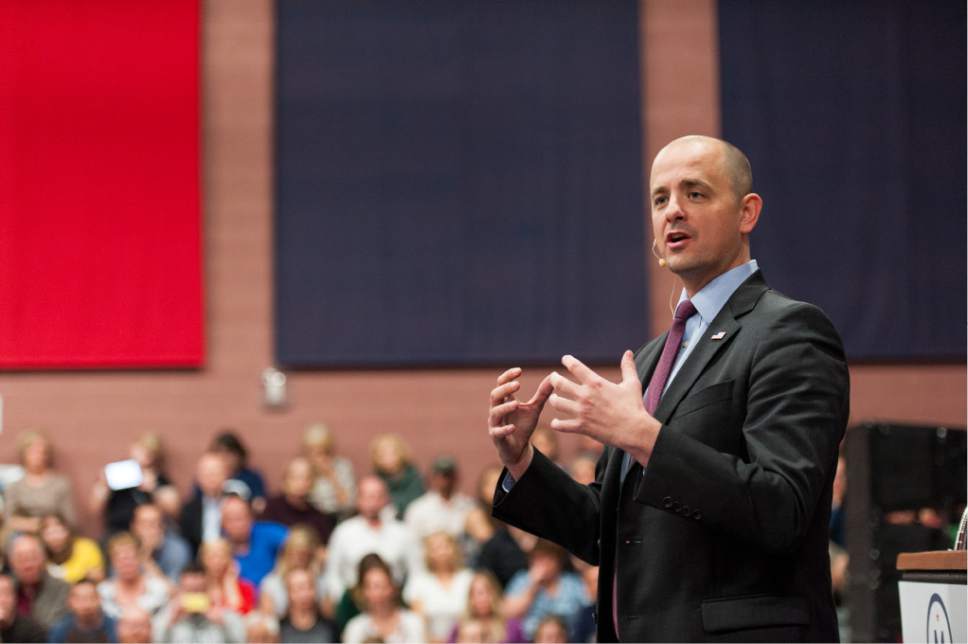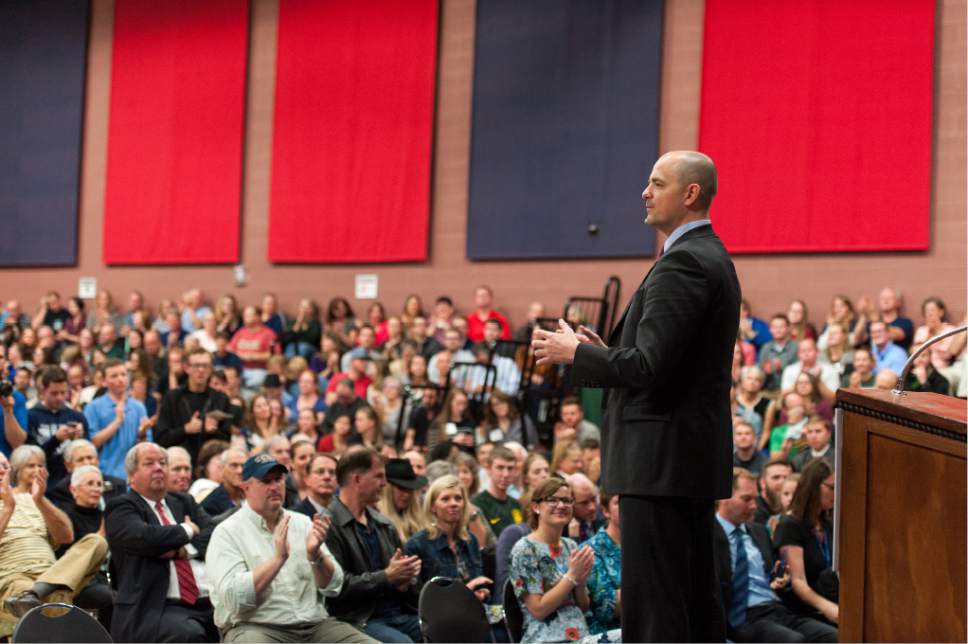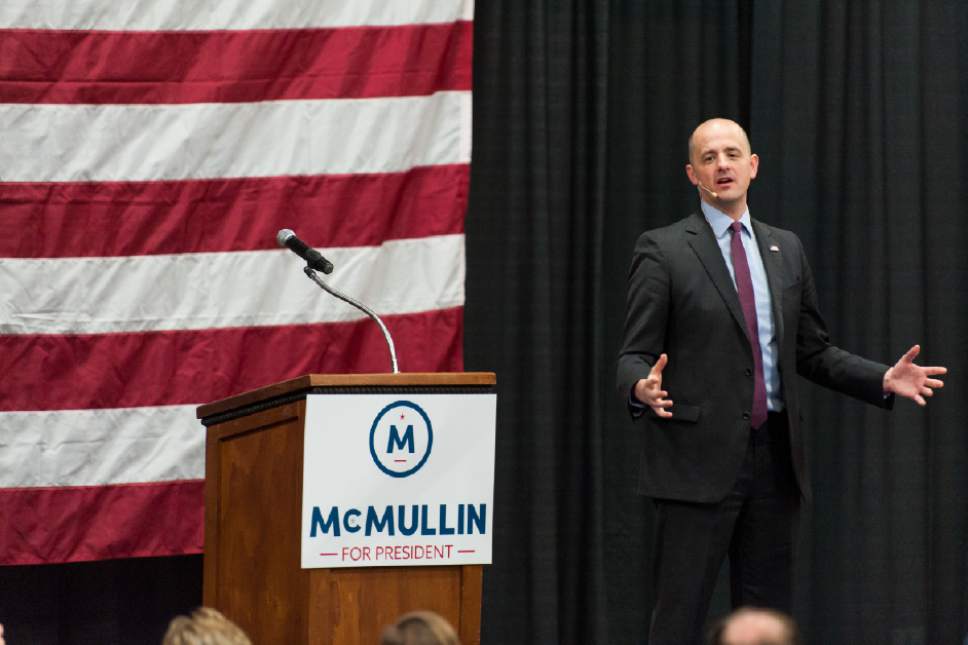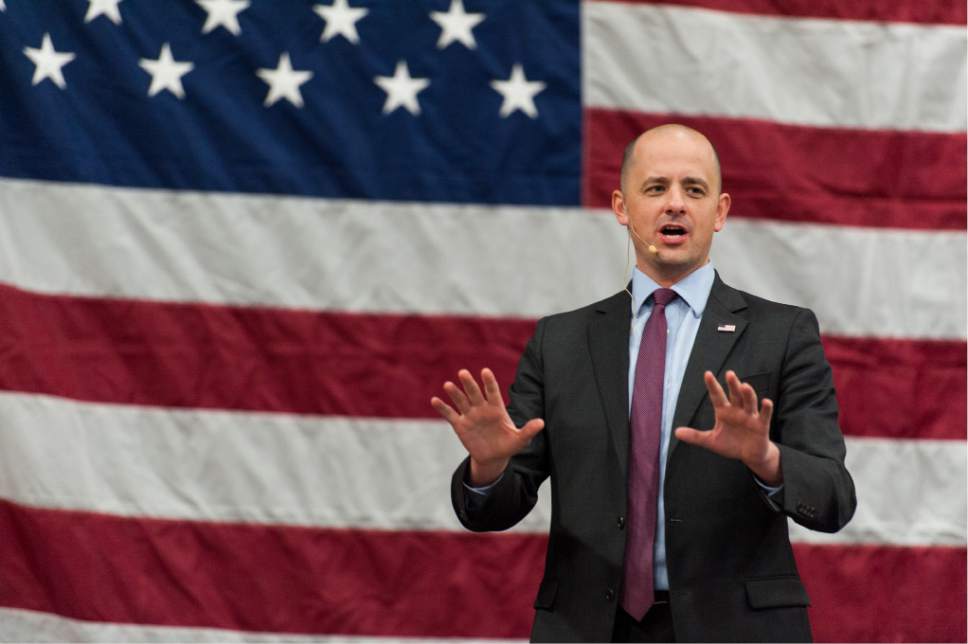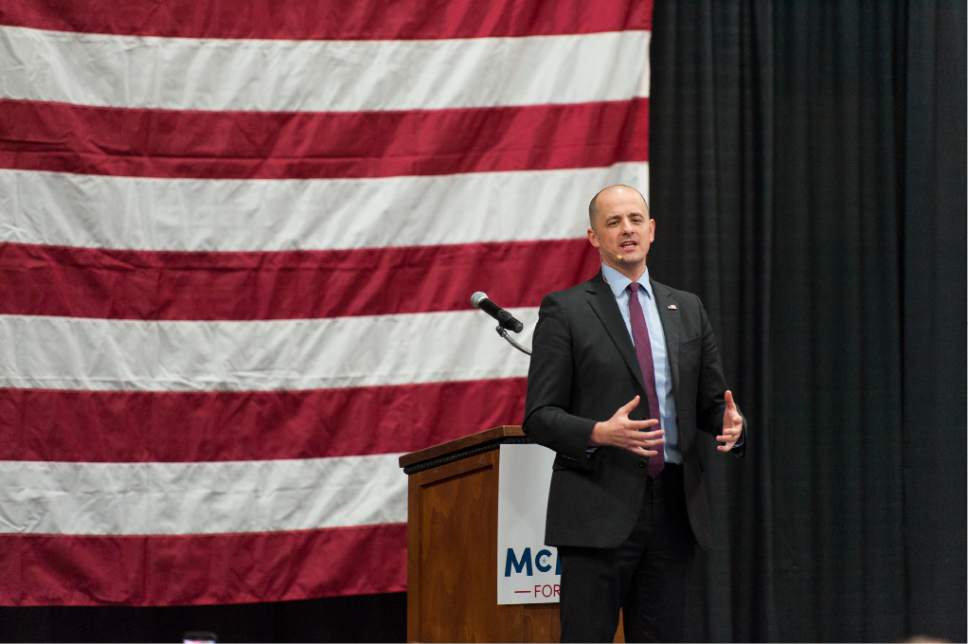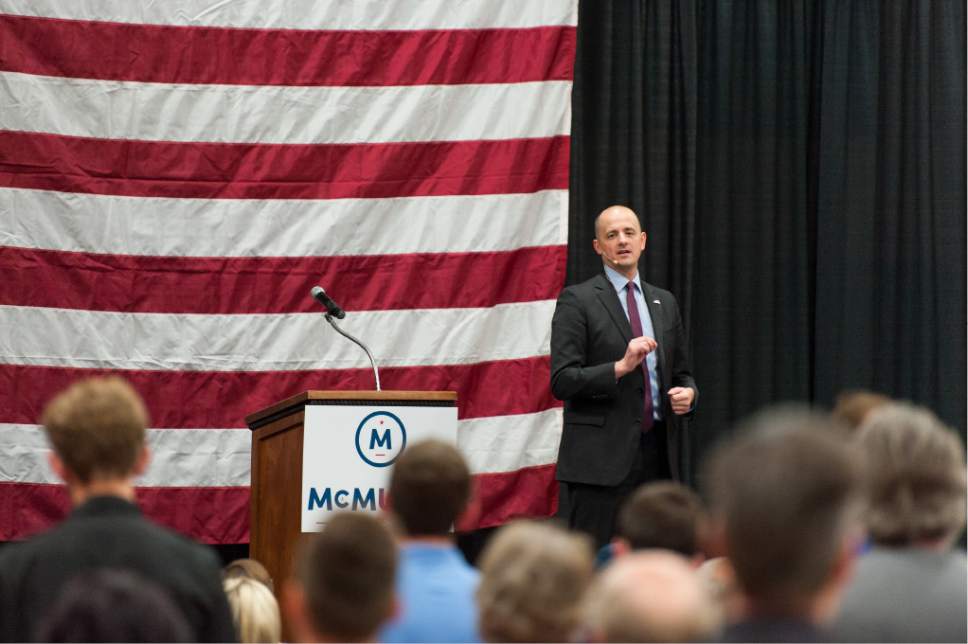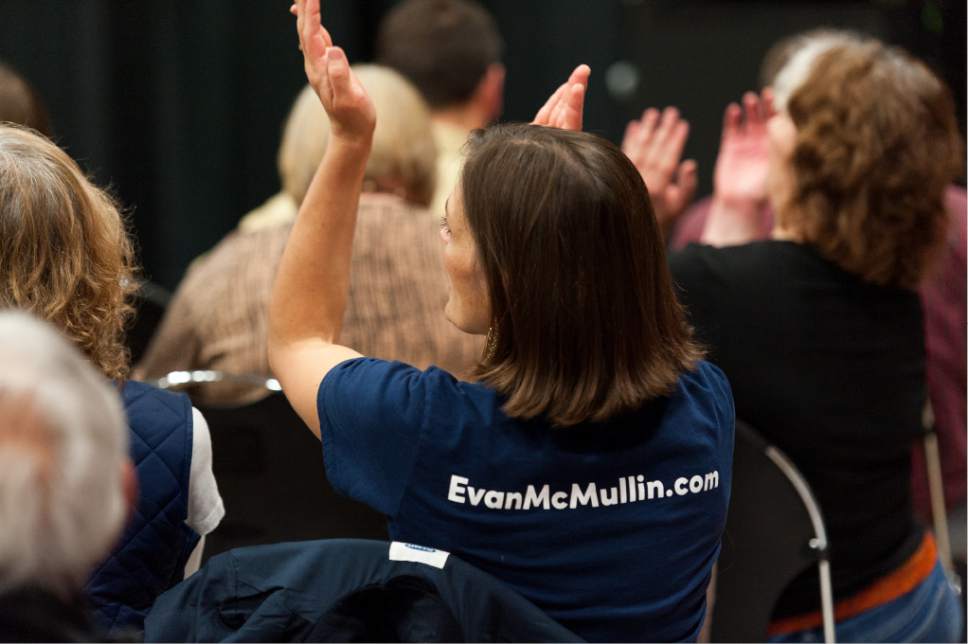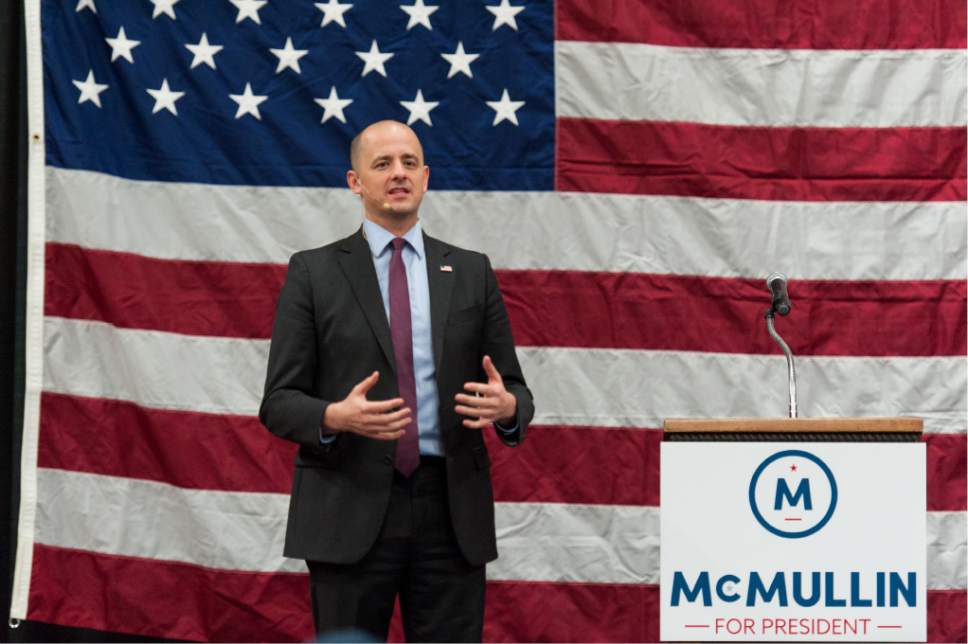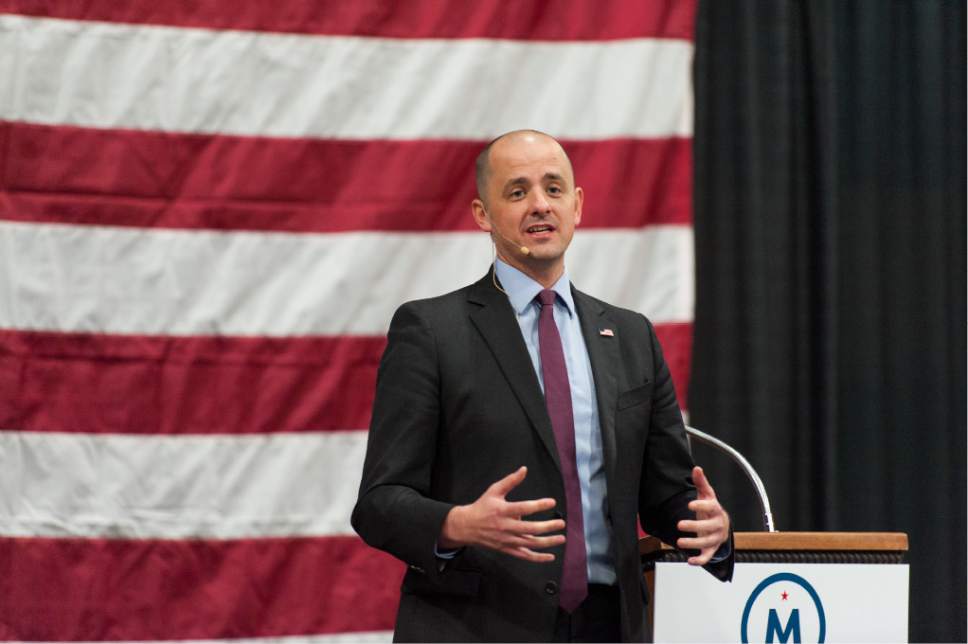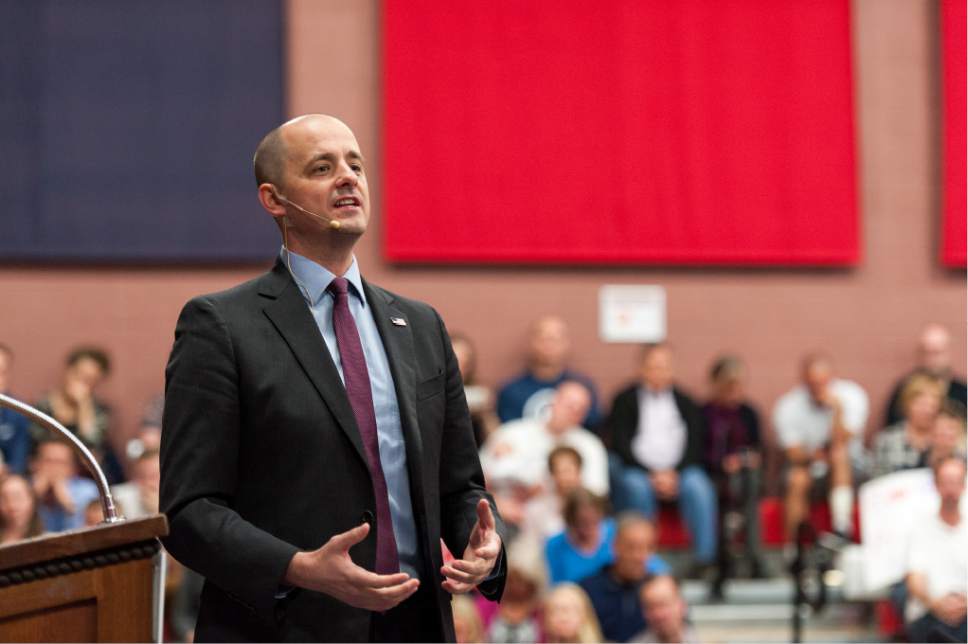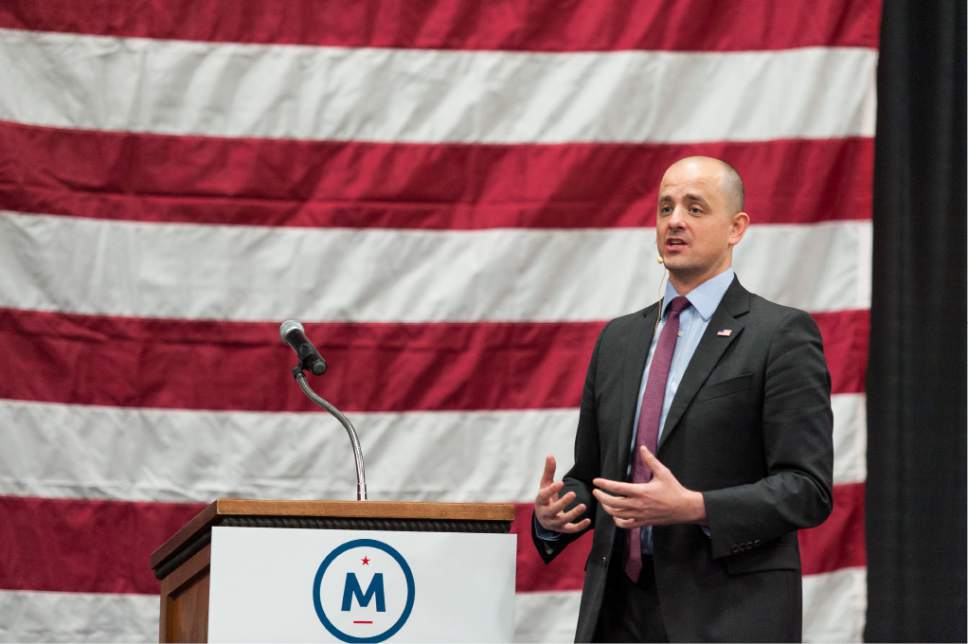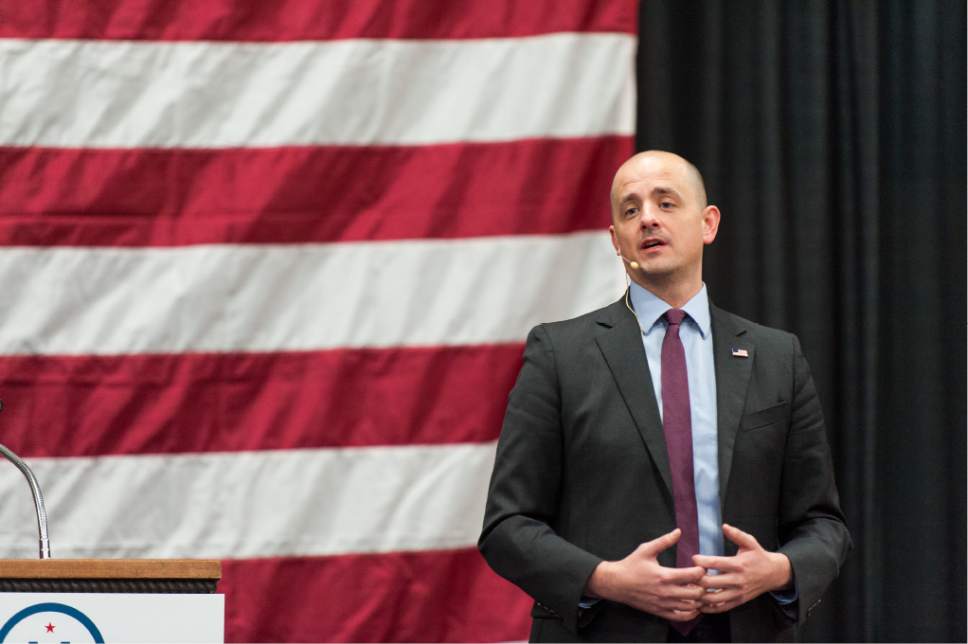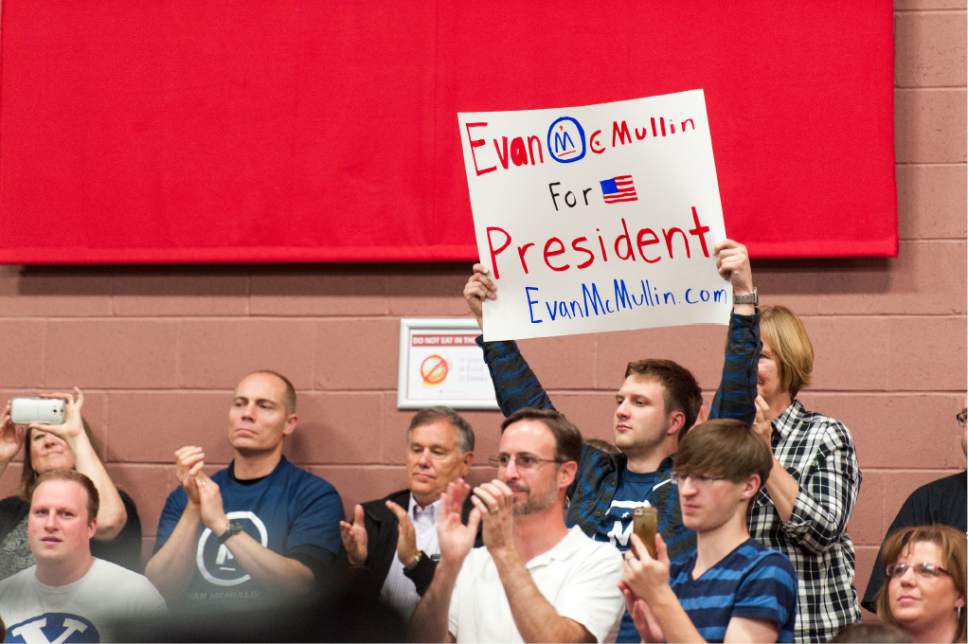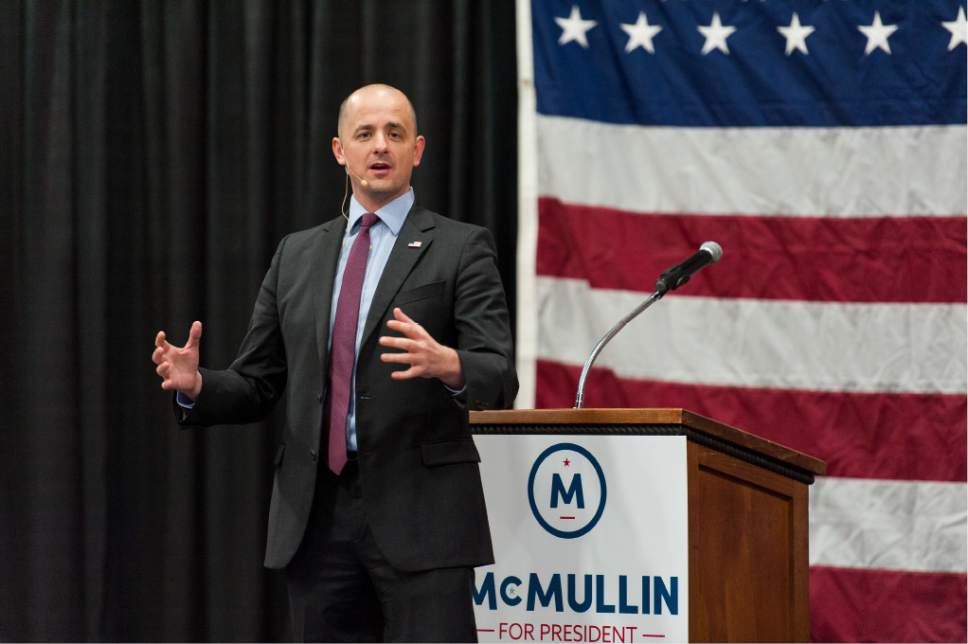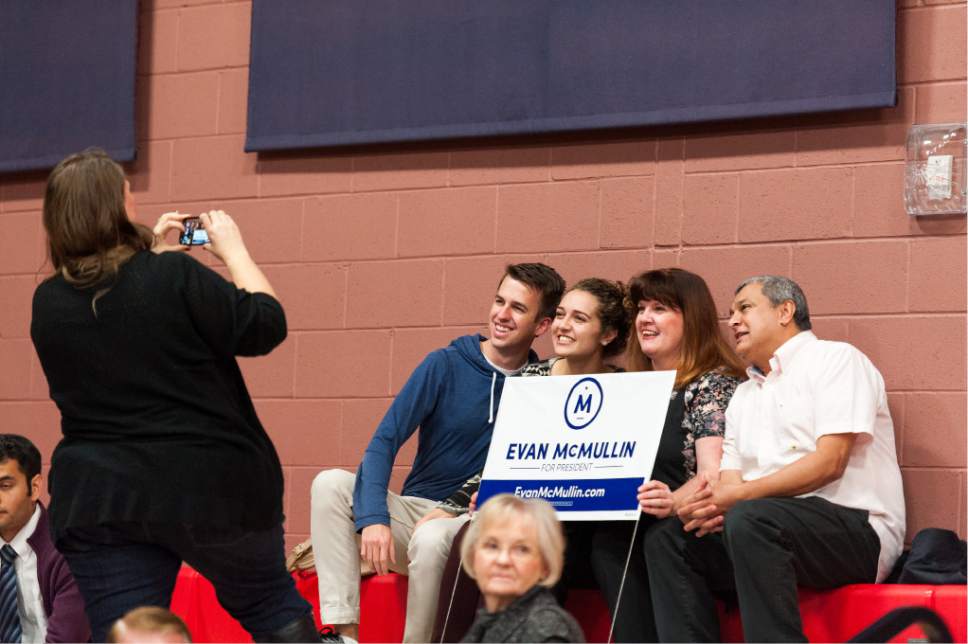This is an archived article that was published on sltrib.com in 2016, and information in the article may be outdated. It is provided only for personal research purposes and may not be reprinted.
An obscure Republican congressional staffer who launched a renegade presidential bid just a few months ago now has a real chance to win Utah — despite historically improbable odds.
A big part of Evan McMullin's appeal is that he is not GOP presidential nominee Donald Trump, but that begs the question: Who is he? McMullin has pitched his candidacy as one focused on the high-minded conservative ideals of liberty, equality and small government, but when he talks about his personal story at rallies, it sounds mostly like a man quickly reciting his résumé.
He tells crowds that he's a former-CIA-operative-turned-investment-banker. He's a one-time party insider disillusioned with Republican officials who were unwilling to challenge Trump, whom he denounces as a "racist." He also is a 40-year-old single Mormon, whose parents divorced; his mother married a woman afterward.
McMullin isn't wealthy, according to his personal financial disclosure. He has more than $100,000 in a retirement account and owns two condos in the Washington, D.C., area, one of which he rents out. He still owes more than $45,000 in student loans.
This unorthodox candidate could become the first third-party candidate to win electoral votes in nearly 50 years. Detractors say he's an opportunist taking advantage of Trump's campaign struggles, while supporters say he is a principled patriot standing up when his country needs him.
One thing about McMullin: He is not delusional. He knows Democrat Hillary Clinton is likely to win the election, and he is aware his independent bid could have ruined his career. But as he considered his options and prayed, he believed voters deserved a conservative alternative to Trump. So when Mitt Romney, sitting senators and other well-known Republicans said no, he said yes.
"Someone had to stand up for the basic truth that all are created equal," McMullin said. "Any fear for my own discrediting, for example, for the mockery or whatever I might experience, that wasn't a good enough reason not to do what I strongly felt was the right thing."
—
An intense person • McMullin was born in Provo in 1976 and named David, as were his father and grandfather, though he's always gone by Evan.
When he was 1 year old, his dad graduated from Brigham Young University and took a job in the Seattle area. His parents eventually bought a home on a few acres in Auburn, Wash., a rural, Mormon-heavy area, where they reared McMullin and his three younger siblings. His dad delivered newspapers in the morning and then went to work for the power company as a computer programmer. Lanie McMullin, his mother, ran the "co-op," where she sold bulk foods to neighbors out of the family's garage. They had a big garden, some chickens and sheep.
To stay warm in the winter, the family burned leftover wood scraps from a plant that made pallets. McMullin, his mother and two siblings would spend many summer hours throwing palm-size pieces in the back of their pickup truck.
McMullin remembered overhearing his parents discussing their money woes, worrying they may lose their house. He remembered being confused. How do you lose a house if you own it? Who actually takes it from you?
"I felt that stress even though I didn't fully understand it," he said.
That took place not long after his first foray into politics. He was elected sixth-grade class president at Lake View Elementary with the slogan "man with a plan." His buddy Curt Leonard remembers McMullin's platform was to clean up a nearby park.
"He was a very intense person, even when we were young," said Leonard, now an attorney living in Washington state. "He was very passionate about what he believed in."
And he also knew what he wanted to do at a young age. His dad brought home a VHS tape of "Three Days of the Condor," a spy thriller starring Robert Redford. After watching it, he became obsessed with the CIA, began reading books and in high school, he contacted a recruiter with the agency.
His younger brother, Neil, said McMullin also wrote for the high school newspaper, including a story about the life of homeless people in Seattle. For the story, he slept for a couple of nights in the homeless shelter and walked the streets during the days.
For fun growing up, he'd play backyard football with his buddies and when they got older, Leonard and McMullin would take the bus to Seattle to go to Mariners games and grunge rock shows in the 1990s, seeing bands like Nirvana. McMullin never had a steady girlfriend, but he had a pack of loyal friends, all were members of The Church of Jesus Christ of Latter-day Saints.
McMullin served a Mormon mission in Brazil and when he returned in 1997, he was cash-strapped. His parents, who had split and then got back together, had no money to pay for college, so he took the one-hour bus trip to the wharf in Seattle and tried to persuade a captain to hire him as a deckhand. He ended up on The Cavalier, a fishing vessel headed to Alaska during the summer salmon season. He jokes that mostly he tried not to fall in the ocean.
When he returned, he moved back to the place of his birth to attend LDS Church-owned Brigham Young University. It was a move made with his career in mind. He knew the CIA and the FBI often plucked agents from the school.
—
Undercover • The CIA offers a "co-op" program for college students, allowing them to alternate a semester at a university with a semester in Washington, D.C., usually working as an analyst, where they'd try to find connections between disparate sources of intelligence.
McMullin wanted to be a spy in the field, not a wonk behind a desk, but it was paid work at the agency, so he took it. The university agreed to give him some credit hours as his work focused on Iraq, overlapping with his Middle Eastern studies. He also took a leave from the CIA to study abroad, which led to a stint volunteering for the Office of the U.N. High Commissioner for Refugees.
McMullin graduated in 2001 and had begun training to be an undercover operative when the terrorist attacks of Sept. 11 changed the world, adding new urgency to his chosen career path and setting him on the course to spend the next 11 years bouncing between Washington and deployments in Southeast Asia, the Middle East and North Africa.
McMullin is circumspect when talking about his CIA work, naturally. He says his job was to cultivate sources within terrorist networks and then work with Navy SEALs, the Army's Delta Force and the FBI to disrupt their plans. The job thrust him into many of the world's most-dangerous locations.
"I've had my fair share of exposure to firefights and conflicts," he said on one radio show. During a Bloomberg TV interview, he wouldn't say whether he has ever killed anyone.
"I don't think answering that kind of question directly is the thing for me to do," he said. "But I worked very hard and served the country honorably everywhere I went."
Pressed again, McMullin added: "I certainly located terrorists and those terrorists were either arrested or sometimes killed. That is what happened."
Critics have questioned the legitimacy of McMullin's CIA experience, but Kevin Hulbert, a senior CIA officer who retired in 2014, confirms his service.
"Evan is one of the best case officers I ever worked with," said Hulbert, who now works as a consultant. "He did real, no-kidding work in harm's way for years at a time."
—
Family life • McMullin left the CIA in 2010. "I felt we had the terrorism threat under control," he said, with al-Qaida diminished and the Islamic State group not yet a force. But his departure was also personal.
"I spent much of my 20s and early 30s working in a way that made it difficult for me to date, and I wanted to get married. I surmised if I continued in that line of work, it was unlikely to happen."
He knows people wonder why he hasn't married, particularly in Utah, where many find a spouse in their early 20s. He says he's "hopeful and optimistic that that will happen soon. … My greatest aspiration is to be a husband and father."
His parents' separation and eventual divorce, which took place during the early part of his CIA career, was tough.
"It hurts, to be honest," he said. "It was hard on me, even though I was old. It taught me how valuable family is, frankly."
His view on family was rocked again when his mom moved in with a woman, whom she later married. The LDS Church staunchly opposes gay marriage.
"As far as my mother's marriage is concerned, I believe in the sanctity of traditional marriage. It is an important part of my faith," McMullin said. "My mother has a different view. That is OK. I love her very much, and she is one of my best friends. She is a wonderful mother. I wish everyone could have a mother like my mom."
Neil McMullin agrees with Evan's views on gay marriage, but he also said his mom's lifestyle hasn't strained family ties.
"It is something we all had to get used to and think about, but it hasn't kept us from being a close family," he said. "We respect and love each other."
Lanie and her wife have donated to McMullin's campaign, as have other members of his family. She did not return calls for comment.
Asked about his position on gay marriage, McMullin takes a more-lenient stance than most Mormon politicians. He believes opposite-sex marriages are best for "our families and our society," but he also says he respects the Supreme Court decision legalizing gay marriage and wouldn't seek to overturn it.
"I am not entirely comfortable with us using the force of law to make this decision for adults in our country," he said.
McMullin says his position hasn't been altered by his mother's relationship. "It didn't change my view on the issue in any way."
—
Crazy hours • For a man eager to marry and have kids, his next career choice didn't smooth the path, He went straight from the CIA to the Wharton School of Business at the University of Pennsylvania and, when he graduated, landed a job with Goldman Sachs in San Francisco. He was part of a team of young MBA graduates who worked on mergers and acquisitions, and helped companies raise capital. It wasn't a simple 9-to-5 job.
"There were times I would do two all-nighters in a row," he said. "It was definitely not something that's sustainable in the long term, or healthy in any way. But I knew that going into it. I knew that was what I was signing up for."
Jared Teo was McMullin's classmate at Wharton and on the same team at Goldman Sachs. He said everyone spent crazy hours at the office and had little time for a social life. Outside of work, the only activity he knew McMullin engaged in was church.
Teo said McMullin never complained about the workload, and describes him as curious and thoughtful. They talked about his time in the CIA, but didn't discuss politics, largely because Teo wasn't that interested. McMullin was. He started volunteering for Romney's 2012 campaign and raised some money, giving him a chance to get to know some of the candidate's advisers, particularly those with similar foreign policy experience. After Romney lost to President Barack Obama, the Republicans on the House Foreign Relations Committee were looking for a new adviser with counterterrorism experience. They tapped Romney's campaign, which led a former CIA officer to call McMullin.
After nearly three years at Goldman Sachs, McMullin was ready to take on a new position.
—
A new movement • He worked for Rep. Ed Royce, R-Calif., who led the committee, and while McMullin's portfolio involved everything in the Middle East and Southeast Asia, he developed a special focus on Syria, due to the confluence of its brutal civil war and the rise of the Islamic State. He advocates for a bigger role for the U.S. military in the conflict, through arming rebels and other allies in the area. He says he doesn't want a full-scale "invasion." House Republican leaders asked him to brief them on the subject and that led to a job as the policy director for the House Republican Conference, a role in which he managed a staff that crafted positions on everything from taxes to energy.
It was from this vantage point that he observed the crowded Republican primaries, where he saw several candidates he could support and one that he could not. He started criticizing Trump to his limited Facebook and Twitter audiences, which resulted in suggestions from within Congress that he should remain out of the fray. He said he had direct conversations with lawmakers urging them to stand up to Trump, even if it could cost them their re-elections.
After Trump gained the nomination, McMullin decided he needed to find someone outside of the Republican Party to support. The Washington Post has reported that Rep. Adam Kinzinger, R-Ill., put McMullin in touch with Bill Kristol, editor of The Weekly Standard, and an avowed "Never Trump" conservative trying to recruit someone to run as an independent. Kristol pointed McMullin to a group called "Better for America" that was organizing such a run. McMullin thought he could be a foreign policy adviser and was willing to quit his job if necessary. He didn't expect to be asked to be the candidate.
When he was, he agonized over the decision for 10 days, talking to friends in the media and politics, consulting with family and praying. His family and friends were stunned and suggested potential downsides, but they were also supportive.
He said he felt his conviction solidify as the days went on, but didn't make the final call until he launched his campaign Aug. 8. That morning he placed two calls to his supervisors in Congress, including one to Rep. Cathy McMorris Rodgers, R-Wash., the chairwoman of the House Republican Conference. He got voicemail on both calls, leaving messages saying he was resigning. He's never heard back from them. McMorris Rodgers and Royce, who are supporting Trump, did not return calls for comment.
Since then, McMullin has moved forward with a tenuous and increasingly unlikely plan to stop Trump and Clinton from reaching the 270 electoral votes necessary to win the presidency. His team, including veteran GOP strategists Rick Wilson and Joel Searby, decided to locate the campaign headquarters in Salt Lake City, since Utah had already shown its distaste for Trump, who came in third in the GOP caucuses here.
Then the team got to work getting on the ballot. In Utah, that was easy. It took 1,000 signatures, but elsewhere it has been harder. McMullin appears on ballots in 11 states, while he's a registered write-in candidate in many more.
When he filed, he had to identify a vice presidential nominee. Not having had time to pick one, he relied on a trusted friend, Nathan Johnson, to fill the role as a placeholder. He met Johnson 17 years ago at church. Johnson is a defense contractor who previously lived in the D.C. area and now resides in San Diego. He has given no interviews and declined to speak to The Salt Lake Tribune. He also plays no active role in the campaign.
Instead, McMullin has tapped Mindy Finn, a Republican media strategist who worked on Romney's campaign. The two of them are focused heavily on Utah and the Mountain West, believing a strong showing could launch a "new conservative movement" and, maybe, a new political party that lasts far past Election Day.
Twitter: @mattcanham


